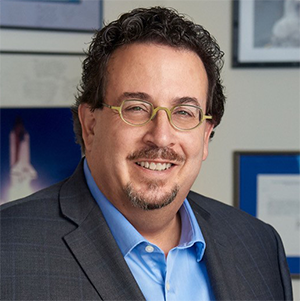

 Dr. Eric Anderson
Dr. Eric Anderson
Eric Anderson is President of And One Technologies and a startup investor, advisor and mentor in aerospace, IoT, mobility and medical systems. He has contributed to dozens of space products, missions, and programs. Eric currently supports technology and business aspects of several satellite and space activities. He emphasizes delivery of data and services via new technologies, channels, and business models including government access and use of emerging commercial space products and services.
As Chief Technologist for Space at Moog, he helped lead the company’s space business and collaborated with worldwide colleagues on business strategy, technology and innovation across multiple markets. Eric was part of the leadership team at the nationally-recognized small company CSA Engineering, serving several years as President.
He was on the technical staff at Jet Propulsion Laboratory, worked at Sikorsky Aircraft, served eight years as a city Planning Commissioner and is on the board of the Kenya-based education non-profit The Kilgoris Project. Eric earned BS, MS and Ph.D. degrees in Aeronautics and Astronautics at MIT.
 Debra Facktor
Debra Facktor
Debra Facktor is the Head of U.S. Space Systems for AIRBUS U.S. Space & Defense, Inc., reporting to the Chairman and CEO of Airbus U.S. She joined the company in March 2020 and is responsible for managing the two businesses within U.S. Space Systems: National Security Space and Space Exploration. She also represents Airbus on the board of Airbus OneWeb Satellites, a joint venture between Airbus and OneWeb operating a high-volume, high-speed satellite production facility in Florida, leveraging Airbus’ long standing heritage in satellite manufacturing.
Prior to joining Airbus U.S., Debra was Vice President and General Manager of Strategic Operations for Ball Aerospace, leading the company’s Washington DC operations, strategic development, and marketing and communications. Her extensive business experience includes serving as President and Owner of AirLaunch LLC, a small business that won funding from the Defense Advanced Research Projects Agency (DARPA) and as Vice President of Business Development and Strategic Planning for Kistler Aerospace Corporation, a company that was developing a privately-funded reusable launch vehicle for the telecommunications satellite and International Space Station commercial resupply markets. Earlier in her career, Debra was Chief of Moscow Operations for ANSER’s Center for International Aerospace Cooperation.
Debra is actively engaged as a board member, advisor and mentor in the aerospace community, with organizations such as the Intelligence and National Security Association (INSA), American Institute of Aeronautics and Astronautics (AIAA), Future Space Leaders Foundation, Brooke Owens Fellowship Program, Women in Aerospace and the International Women’s Forum. She serves on the Industrial Advisory Board of the University of Michigan aerospace engineering department and as an adjunct faculty member of the Johns Hopkins University systems engineering department. She is a fellow of AIAA and the American Astronautical Society (AAS) and an academician of the International Academy of Astronautics (IAA).
Debra received her bachelor’s and master’s degrees in aerospace engineering from the University of Michigan, and is an alumna of the International Space University summer session program in Strasbourg, France.
 Mike Kaplan
Mike Kaplan
Mike Kaplan is a leader in the space arena with an impressive track record of building diverse teams that achieve powerful results. He is a visionary thought leader with extensive experience in government and commercial industries, previously holding senior leadership positions at NASA, Boeing, Raytheon Technologies, Ball Aerospace, Space Systems Loral, and Belcan.
Mike has led teams in the development of new space technologies, including highly complex payloads, spacecraft subsystems, spacecraft buses, planetary landers, and robotic satellite servicers. He’s also contributed his expertise to entire missions from LEO to deep space in the civil, commercial, and national security arenas. Recently, his focus has been on proliferated LEO constellations to revolutionize weather prediction.
Mike earned a bachelor’s in Aerospace and Mechanical Sciences/Engineering Physics at Princeton University and a master’s in Electrophysics at The George Washington University.
 Casey Kelby
Casey Kelby
Casey is a business development manager at Kongsberg NanoAvionics, a global prime provider of wide-applicability End-to-End small satellite constellation technology, including full scale of satellite mission services – satellite design, manufacturing, assembly, payload integration, testing campaign, launch brokerage, logistics and finally – mission operations and data delivery to a customer. Responsible for NanoAvionics business development and partnerships in USA, Canada and Mexico, Casey is well equipped with the knowledge about space technology developments in the region, and existing ecosystems of emerging upstream and downstream players.
 Michael Pavloff
Michael Pavloff
Michael Pavloff has been in the space business for 35 years, working in satellite and launcher products for commercial, international and US Government customers. In the early part of his career, Mike served as chief engineer and program manager on a number of US Government programs for Boeing and Raytheon. He also served as executive director at Maxar, managing a number of European contracts in the GEO telecom world.
More recently, Mike has served as CTO of RUAG Space (now Beyond Gravity) and OneWeb Satellites. In his role as VP Strategic Solutions at Terran Orbital, he is responsible for developing new satellite architectures and industrialization plans for constellations and serial production, as well as technology roadmaps required to support those architectures. Mike has a bachelor’s degree in physics from Harvard and a master’s degree in aero and astro engineering from MIT.
 Al Tadros
Al Tadros
Al Tadros is the Chief Technology Officer of Redwire. In this role, he is focused on making strategic investments that support Redwire’s customers, advancing technology development and commercialization, and maintaining a nimble and collaborative technical culture. With nearly three decades of experience as an aerospace executive, Al is a thought leader in in-space servicing, assembly and manufacturing with a proven track record in maturing satellite and space systems programs for exploration, national security, and commercial innovation.
Previously, Al was Chief Growth Officer and Executive Vice President of Space Infrastructure at Redwire. In this role, he oversaw the company’s long-term growth strategy and business development activities, and was responsible for advancing development, increasing adoption, and building momentum for Redwire’s mission-enabling capabilities within the civil, defense, and commercial space sectors.
Prior to Redwire, he served as Vice President of Space Infrastructure and Civil Space at Maxar Technologies, where he led significant innovation in next-generation spacecraft design and space infrastructure, integrating robotics and in-space satellite manufacturing, servicing, and assembly capabilities. Over the course of his career at Maxar, Al contributed to 13 missions and launch campaigns, many of which deployed cutting-edge communications and remote sensing systems. Al has worked with both commercial enterprises and government agencies to develop space systems for communications, satellite servicing, remote sensing, and exploration.
An authority in in-space servicing, assembly, and manufacturing, Al holds patents in the field of attitude control systems and was responsible for early telerobotics research for the International Space Station.
He holds a bachelor’s degree in aerospace engineering and a master’s degree in mechanical engineering from Massachusetts Institute of Technology (MIT).